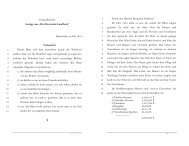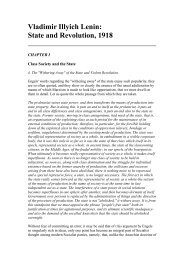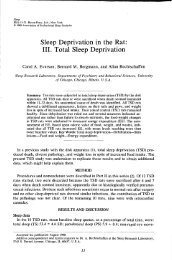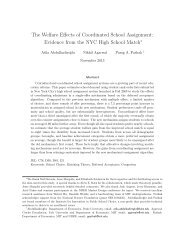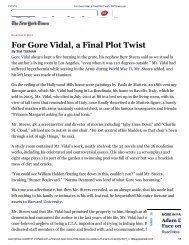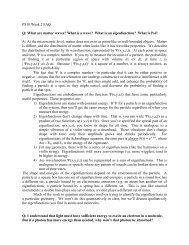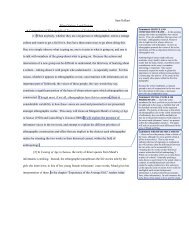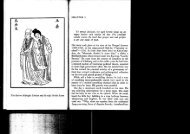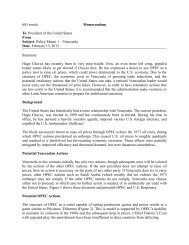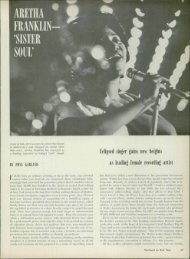What Did You Do in the War, Mutti? Courageous Women ... - iSites
What Did You Do in the War, Mutti? Courageous Women ... - iSites
What Did You Do in the War, Mutti? Courageous Women ... - iSites
You also want an ePaper? Increase the reach of your titles
YUMPU automatically turns print PDFs into web optimized ePapers that Google loves.
568 Robert G. Moeller<br />
was Bernhard Wicki, <strong>the</strong> commander at <strong>the</strong> front. Wicki—a well-known<br />
actor and later director of Die Brücke, one of <strong>the</strong> best known West German<br />
war films—had also starred <strong>in</strong> Helmut Käutner’s Die letzte Brücke, a war<br />
film that came out of a German Yugoslavian collaboration a year before<br />
KMG opened. In 1955, he would also appear as Count von Stauffenberg<br />
<strong>in</strong> Es geschah am 20. Juli, play<strong>in</strong>g <strong>the</strong> leader of <strong>the</strong> unsuccessful military conspiracy<br />
to assass<strong>in</strong>ate Hitler. 14 Beyond <strong>the</strong> pr<strong>in</strong>cipals, <strong>the</strong> cast also featured<br />
such talent as Maximilian Schell, who won an academy award six years later<br />
for defend<strong>in</strong>g Burt Lancaster on trial as a Nazi judge <strong>in</strong> Judgment at Nuremberg,<br />
and Klaus K<strong>in</strong>ski, who had appeared <strong>in</strong> Morituri (1948), one of <strong>the</strong> few<br />
postwar German films to take <strong>the</strong> concentration camp victim as its central<br />
focus, and Decision Before Dawn, an American film about Germans who<br />
are recruited as anti-fascist spies late <strong>in</strong> <strong>the</strong> war, <strong>in</strong> which K<strong>in</strong>ski had a small<br />
role as <strong>the</strong> ‘wh<strong>in</strong><strong>in</strong>g soldier.’ 15 No o<strong>the</strong>r West German war film could boast<br />
such a formidable group, even if <strong>the</strong> l<strong>in</strong>es <strong>the</strong>y spoke often came <strong>in</strong> unadulterated<br />
form out of Re<strong>in</strong>ecker’s pulp fiction.<br />
Re<strong>in</strong>ecker’s tale beg<strong>in</strong>s <strong>in</strong> March 1945. The film opens with scenes of an<br />
idyllic rural landscape—dotted with storm clouds. Military music and <strong>the</strong><br />
sounds of gunfire <strong>in</strong> <strong>the</strong> background give way to French horns and <strong>the</strong> music<br />
of <strong>the</strong> Heimat. The battle front and <strong>the</strong> home front are not all that far apart.<br />
Arriv<strong>in</strong>g at a tra<strong>in</strong> station ‘east of Stett<strong>in</strong>’, Frau Helene Asmussen, a<br />
radiantly blonde, somberly dressed Hilde Krahl, emerges <strong>in</strong>to <strong>the</strong> midst of<br />
chaos as refugees flee<strong>in</strong>g <strong>the</strong> approach<strong>in</strong>g Red Army push <strong>the</strong>ir way on to<br />
<strong>the</strong> tra<strong>in</strong> from which she exits. She has only one th<strong>in</strong>g <strong>in</strong> m<strong>in</strong>d—locat<strong>in</strong>g<br />
her son, a schoolboy who has been moved here from Stett<strong>in</strong> because of<br />
<strong>the</strong> bombs fall<strong>in</strong>g on that city. Immobilized by clueless personnel <strong>in</strong> <strong>the</strong> tra<strong>in</strong><br />
station, Helene is rescued by a force of nature, Giehse’s Mutter Bergmann,<br />
<strong>the</strong> work<strong>in</strong>g-class wife of a mechanic, who is also <strong>in</strong> search of loved ones—<br />
two sons who have been removed to <strong>the</strong> same board<strong>in</strong>g school. Mutter<br />
Bergmann takes no flak and states her case forcefully: ‘We want to get<br />
our sons, that’s all.’ When she and Helene f<strong>in</strong>ally locate <strong>the</strong> school, <strong>the</strong>y discover<br />
that it has been transformed <strong>in</strong>to a barracks, a foreshadow<strong>in</strong>g of what<br />
has become of <strong>the</strong>ir boys. Helene and Mutter Bergmann quickly learn that<br />
toge<strong>the</strong>r with o<strong>the</strong>rs from <strong>the</strong> school, <strong>the</strong>ir loved ones have left that morn<strong>in</strong>g,<br />
not <strong>in</strong> beanies and blazers but <strong>in</strong> Wehrmacht uniforms, off to <strong>the</strong> front<br />
and <strong>the</strong> defence of <strong>the</strong> Vaterland. Echo<strong>in</strong>g <strong>the</strong> orig<strong>in</strong>al title of Re<strong>in</strong>ecker’s<br />
14 See Klaus Kreimeier, ‘Die Ökonomie der Gefühle: Aspekte des westdeutschen Nachkriegsfilms’,<br />
<strong>in</strong> Hilmar Hoffmann and Walter Schobert (eds), Zwischen Gestern und Morgen: Westdeutscher<br />
Nachkriegsfilm, 1946 1962 (Frankfurt=Ma<strong>in</strong>, 1989), pp. 24 27; also Wilhelm Roth, ‘E<strong>in</strong> Darsteller<br />
mit Gestaltungskraft: Gedanken zu Filmen des Schauspielers Berhard Wicki’, <strong>in</strong> Robert Fischer<br />
(ed.), Sanftmut und Gewalt: Der Regisseur und Schauspieler Berhard Wicki (Cologne, 1991),<br />
pp. 53 8.<br />
15 On K<strong>in</strong>ski, see http:==www.klaus-k<strong>in</strong>ski.de=default.htm. And on Morituri, see Peter Pleyer,<br />
Deutscher Nachkriegsfilm, 1946 1948 (Münster, 1965).





